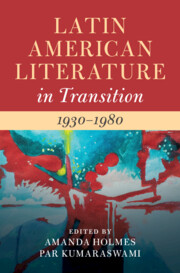Book contents
- Latin American Literature in Transition 1930–1980
- Latin American Literature in Transition
- Latin American Literature in Transition 1930–1980
- Copyright page
- Contents
- Contributors
- Introduction
- Part I War, Revolution, Dictatorship
- Part II Metropolis and Ruins
- Part III Solidarity
- Chapter 9 “Dar Testimonio” as a Lens for Rethinking the Mexican Literary Canon
- Chapter 10 Landscapes of Heterogeneity in a Mid-Twentieth-Century Quechua Poem
- Chapter 11 Beyond the Nation Frame
- Chapter 12 Femininity in Flux
- Chapter 13 The Representation of Afro-Cuban Orality by Fernando Ortiz, Lydia Cabrera, and Nicolás Guillén
- Part IV Aesthetics and Innovation
- Index
- References
Chapter 12 - Femininity in Flux
Gabriela Mistral’s Madwomen
from Part III - Solidarity
Published online by Cambridge University Press: 24 January 2023
- Latin American Literature in Transition 1930–1980
- Latin American Literature in Transition
- Latin American Literature in Transition 1930–1980
- Copyright page
- Contents
- Contributors
- Introduction
- Part I War, Revolution, Dictatorship
- Part II Metropolis and Ruins
- Part III Solidarity
- Chapter 9 “Dar Testimonio” as a Lens for Rethinking the Mexican Literary Canon
- Chapter 10 Landscapes of Heterogeneity in a Mid-Twentieth-Century Quechua Poem
- Chapter 11 Beyond the Nation Frame
- Chapter 12 Femininity in Flux
- Chapter 13 The Representation of Afro-Cuban Orality by Fernando Ortiz, Lydia Cabrera, and Nicolás Guillén
- Part IV Aesthetics and Innovation
- Index
- References
Summary
The perception of Gabriela Mistral and her poetry has transformed over the years: the image of Mistral as the traditionalist and conservative poet, fostered by the Pinochet dictatorship, has been replaced by that of a strong independent voice who, in part, stands for the liberation from society’s gender prescriptions. This chapter focuses on the series of poetry, Locas mujeres (Madwomen), published in Lagar (Winepress, 1954), to demonstrate how this new perception of Mistral holds true in her representation of women in these poems. In line with Mistral’s earlier poetry that underscores women’s voices that have typically not been heard, such as those of the pregnant women of Poemas de las madres (The Mothers’ Poems), the women from this series, designated “insane” by the title, and society, expose their true selves. This chapter first places this whole series in the context of Mistral’s poetry, and finally focuses on two poems, “La bailarina” (“The Dancer”) and “La que camina” (“She Who Walks”), to demonstrate their particular expressions of women’s liberty.
- Type
- Chapter
- Information
- Latin American Literature in Transition 1930–1980 , pp. 198 - 210Publisher: Cambridge University PressPrint publication year: 2022

